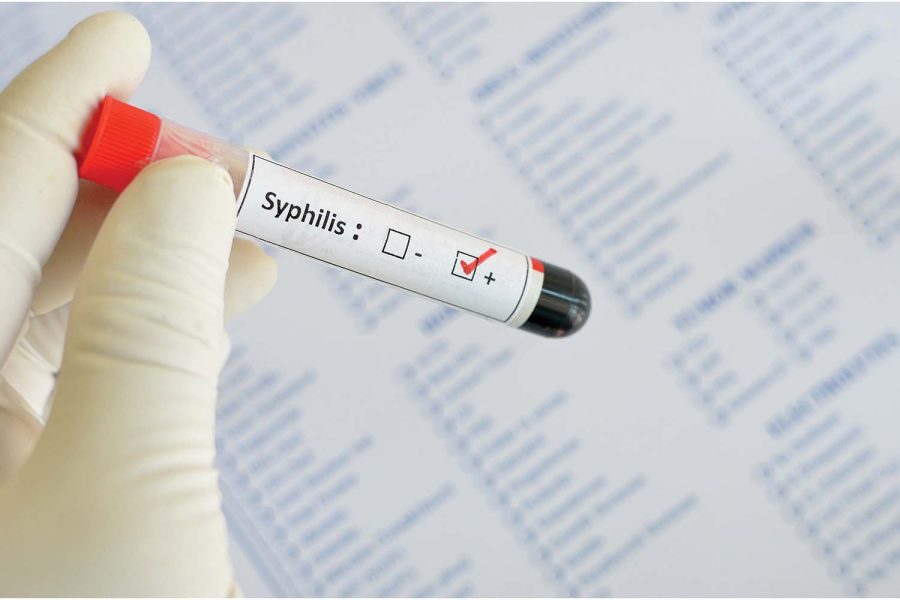Cases of syphilis up 75 percent in Iowa
Preliminary data shows an increase in cases of the sexually transmitted disease in the state over the past year.
November 28, 2021
Cases of syphilis are on the rise in Iowa.
Preliminary data shows a 75 percent increase in cases of syphilis from 2020 to 2021, said George Walton, program manager for sexually transmitted diseases at the Iowa Department of Public Health.
Walton said syphilis cases are rising among different demographics than the disease typically presents in.
According to the Centers for Disease Control and Prevention, the majority of syphilis cases in the U.S. are among men who have sex with men. Within the state, Walton said there have been more syphilis diagnoses among women.
“We have seen an increase, for the persons that have been diagnosed, more individuals that are self-reporting drug use, so that is likely a factor as well,” Walton said. “But I would say there is no one single population or single factor that is contributing by itself to the increase — it seems to be a combination of factors.”
Syphilis can be cured with antibiotic treatment, according to the CDC. However, if the disease is not discovered and diagnosed before it progresses, it can affect the heart, blood vessels, brain, and nervous system.
While data from 2021 is not yet available, there were 140 more cases of syphilis in Iowa in 2020 than in 2019, according to the state’s surveillance data.
In 2020, over 80 percent of syphilis cases in the state were among men.
Walton said national data for 2020 and 2021 rates of STDs have not yet been released, but anecdotally, cases seem to be rising nationwide.
“My colleagues and I across the country speak to one another, and everybody that I’ve spoken with in other states are seeing increases, particularly in syphilis,” he said. “That’s very noticeable, but the rate of increase here in Iowa seems to stand out a bit more.”
Cases of congenital syphilis, when the disease is passed from a pregnant person to their fetus, have also spiked dramatically this year, Walton said.
RELATED: STD tracing in Iowa disrupted as COVID-19 cases rise
“The increases we’ve seen this year in Iowa, for that, have been historic, to be honest about it,” Walton said. “We’ll finish the year with at least 10 that meet the case definition, which may not seem like a lot, but just to put that in perspective, last year we had one, and in 2013, we had three, and that was a big, high number. So, to have 10 in a single year is significant.”
Cases of congenital syphilis have risen nationwide as well, according to the CDC. In 2020, more than 2,000 cases were reported, the highest level since 1994.
Kathryn Edel, a health educator for Johnson County Public Health, said cases of syphilis have increased in the county as well.
Johnson County Public Health offers rapid syphilis testing, which is now available for anyone who wants to be tested, Edel said.
“It used to be that we were only able to offer rapid syphilis testing to select folks, so folks who were showing symptoms or had a potential exposure,” she said. “Now, we’re able to open that eligibility requirement up and offer syphilis testing to everyone, and that’s because of what our state is experiencing in terms of syphilis rates.”
Johnson County Public Health takes walk-in appointments for STD testing, Edel said, adding that the testing program is free and doesn’t require ID or insurance.
“So now would be a great time to receive syphilis testing,” she said.
Rates of chlamydia and gonorrhea, other sexually transmitted diseases, have increased in the state as well, with rates of gonorrhea doubling over the last five years, along with chlamydia, Walton said.
“We typically see increases in chlamydia every year,” he said. “That’s one that is very often asymptomatic, so we often say the more successful you are at testing, the more individuals you’ll diagnose.”
Walton said the Department of Public Health is encouraging more routine testing for the disease.
The current CDC guidelines for syphilis testing are that anyone who has symptoms of syphilis, or a partner who has been recently diagnosed with the disease should be tested, in addition to routine testing pregnant women, and men who have sex with men.
“As we’ve seen increases in Iowa and we’ve seen increases in other parts of the U.S, we’re trying to promote and encourage testing further, because … there’s additional populations that have not been as affected in the past who are affected now,” Walton said. “Essentially, we’re trying to promote that being more of a routine test for folks who are sexually active.”















